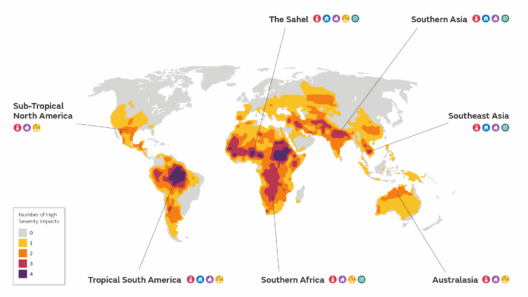The oceans play a pivotal role in regulating the Earth’s climate. They absorb a significant portion of atmospheric carbon dioxide, sequestering it in their depths and dramatically influencing global temperatures. However, this capacity is diminishing, and the consequences of climate change are becoming increasingly apparent. Ocean scientists stand at the forefront of the battle against global warming. Their research and innovative methodologies are not only crucial for understanding these changes but are also instrumental in devising strategies to mitigate them. This discourse explores how ocean scientists can help curb global warming, protecting our blue planet for future generations.
Firstly, understanding the intricate dynamics of ocean ecosystems is essential. Ocean scientists employ sophisticated models to study the interactions between marine organisms, water chemistry, and climate systems. These models illuminate the impacts of rising temperatures, ocean acidification, and deoxygenation, revealing alarming trends. For instance, coral reefs, often referred to as the “rainforests of the sea,” are particularly vulnerable. When sea temperatures exceed certain thresholds, coral bleaching occurs, leading to the decimation of these biodiverse habitats. By meticulously tracking these changes, scientists can provide critical insights necessary for conservation efforts.
Moreover, the use of advanced technology plays a crucial role in oceanic research. Underwater drones, remote sensing satellites, and autonomous buoys collect vast amounts of data about ocean temperature, salinity, and currents. This data is invaluable for understanding how climate change is reshaping marine environments. As scientists analyze this information, they can identify patterns and predict future shifts, which are essential for developing adaptive strategies. The integration of big data analytics with oceanographic studies allows for the processing of complex interactions within marine systems, enabling scientists to forecast changes with greater accuracy.
In addition to data collection, ocean scientists advocate for restoration efforts. Restorative measures, such as rewilding marine ecosystems, have gained momentum as an effective approach to enhancing resilience against climate change. Initiatives such as seagrass planting and the establishment of marine protected areas contribute to restoring biodiversity and improving the ocean’s ability to sequester carbon. By focusing on the rehabilitation of degraded ecosystems, scientists can help rejuvenate the ocean’s natural processes, which play a vital role in countering the effects of global warming.
Another important aspect of ocean science lies in climate modeling. The oceans are critical components of the Earth’s climate system, absorbing more than 90% of the excess heat generated by global warming. Consequently, ocean scientists are essential in refining climate models to incorporate the latest data on ocean behavior. Enhanced modeling efforts can provide more accurate projections of future climate scenarios, which is crucial for governments and policymakers worldwide. With reliable predictive models, decision-makers can implement informed policies aimed at reducing greenhouse gas emissions and promoting sustainable practices.
Public engagement and education are equally important. Ocean scientists can bridge the gap between scientific research and public understanding. By communicating their findings to a broader audience, they can raise awareness about the urgent issues facing our oceans and climate. Initiatives that promote ocean literacy—understanding the interconnectedness of the ocean and human activity—are vital for fostering a culture of conservation. For example, citizen science projects that involve local communities in data collection empower individuals to contribute to research while cultivating a sense of stewardship for marine ecosystems.
In tandem with education efforts, collaboration across disciplines is necessary to create a holistic response to global warming. Ocean scientists, climatologists, ecologists, and social scientists must work together to develop comprehensive strategies for climate action. Interdisciplinary research fosters innovative solutions that can tackle the multifaceted challenges of climate change. By pooling expertise, scientists can create sustainable management practices that benefit not only the environment but also the communities reliant on healthy oceans.
Additionally, ocean scientists are exploring innovative technologies to mitigate climate change. For instance, advancements in carbon capture and storage (CCS) technologies offer a pathway for reducing carbon dioxide levels in the atmosphere. Scientists are investigating methods to enhance natural processes, such as biochar application in coastal zones or increasing the alkalinity of seawater to improve carbon sequestration. These technologies, while still in developmental stages, hold promise for reversing some of the detrimental effects of climate change.
International cooperation is essential for tackling issues that transcend national borders. The oceans are global commons, and effective management requires collective action. Ocean scientists play a key role in global initiatives, such as the United Nations’ Sustainable Development Goals, which aim to conserve and sustainably use the oceans. By participating in these frameworks, scientists can advocate for policies that prioritize ocean health and climate stability, ensuring that the voices of science inform governance.
In conclusion, ocean scientists possess the tools, knowledge, and passion necessary to combat global warming and protect our blue planet. Through innovative research, advanced technologies, public engagement, interdisciplinary collaboration, and international cooperation, they are uniquely positioned to lead the charge against climate change. The health of our oceans is intrinsically tied to the well-being of our planet; their preservation is not merely an environmental issue but a necessity for humanity’s future. As science advances and our understanding of the oceans deepens, the potential to reverse the tide of global warming becomes increasingly attainable. The world’s oceans are calling for action, and it is time we heed that call.







